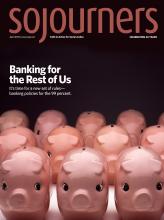“Love ... does not insist on its own way.” —1 Corinthians 13:5
Faith-based communities offer the kind of support and empowerment that can break the cycle of poverty. We need to supplement government funding with personal help. And the first step in personal individualized help is understanding the world in which those in poverty live. Without some training, we could make matters worse and even become angry at the very people we are trying to help if we presume their responses to our efforts will be ones that match our values and lifestyles.
Because of two 60 Minutes pieces on homeless school children in our county (Seminole County, Florida), people in our congregation and other county groups got fired up to help those families transition out of poverty. It seemed wise to our church leaders that we train our congregation members in understanding poverty and some of the thinking of those who are poor. We adopted a course from the Billy Graham Institute for Prison Ministries on transitioning out of generational poverty.
Part of the course alerts those of us who have never been poor to our lack of knowledge on what it takes to survive without adequate income. Would you know where to get help if you had little or no money? What places offer food and how do you get there without a car? Which agencies offer which kind of services—housing, medical attention, job training, child care—in addition to any financial help you can get? Additionally—and this is key in being able to love well—how do those in poverty think differently than those in the middle or upper class?
Read the Full Article
